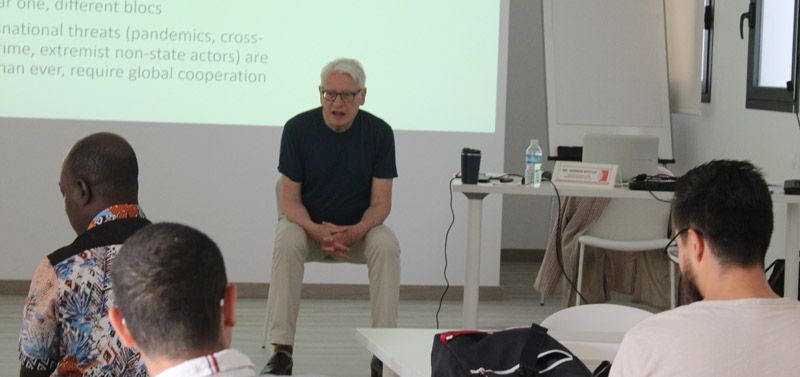Ignore the superficial similarities. This latest war between Israel and Hamas over Gaza – the sixth, and by far the most destructive, since 2005 – is unlike its predecessors in important ways. It’s also highly unlikely to end in the same way as before: the considerable destruction of homes and civilian infrastructure, an inconclusive military and political stalemate and a return to the status quo ante.
You might think you have seen this movie before, but you haven’t. We may be only watching the opening sequence, but one thing is already clear. No one, not Bibi Netanyahu, not Joe Biden, not Ismail Haniyeh, the Hamas leader, nor Ayatollah Khamenei, knows how the war is going to end.
As a shocked world witnessed on 17 October, when an explosion at the Al Ahli hospital in Gaza killed several hundred Palestinian civilians seeking refuge or being treated, the course of conflict can suddenly turn unexpectedly. Once an all-out war starts, it is often out of the hands of those who claim to be in charge. As I write, warning lights about regional escalation are already flashing.
Another sobering conclusion can also be drawn in these early days. The deepest, most existential, fears of Jews and Palestinians alike have been invoked. Like ghosts whose bodies were buried in graves that were too shallow, collective traumas have reemerged into the daylight. As emotions run high on both sides, racial delegitimization of the other is again appearing. Supposedly responsible Israelis describe Palestinians as animals to be killed. If they are to be able to live peaceful lives together once again, a hope that does not look likely in my lifetime, this kind of ugly rhetoric must be banished once and for all.
For Jews, the slaughter of innocents that took place on the war’s opening day, Saturday 7 October, in kibbutzim near the Gazan border fence evoked ancestral memories of antisemitic pogroms in Eastern Europe and the Nazi Holocaust. The fact that many of the kibbutz residents were peace activists committed to living in harmony with their Palestinian neighbours added to the bitter taste.
For Palestinians, Israel’s order to a million Gazans to leave their homes and move south, towards the Egyptian border and even into the Sinai desert, was a vivid reminder that their mass displacement in 1948, the Nakba, is not yet over. Egypt and Jordan fear that they may be obliged to bear the brunt.
Putting aside for a minute the tens of thousands of lives already lost or destroyed, a shockingly large percentage of them women and children, the biggest casualty so far has been respect for international humanitarian law and the rules of war. What has been astonishing is the casual disregard by both sides, especially by Israel, a powerful state that has ratified treaties and conventions governing military conduct in times of war, for the most basic principles.
What adds to my deep dismay is that Israel’s close allies in the West are today either tacitly or explicitly condoning grave breaches of law, many of which amount to war crimes. How it is possible for Western politicians to defend or justify the cutting-off of water, electricity, fuel, food, and medicine to an entire population of 2.3 million, to punish them for the sins of Hamas and oblige it to give up its hostages? This is hard to comprehend. The glaring moral disconnection between the pious statements the West makes constantly about Russia’s actions in Ukraine and what Israel is doing in Gaza does not seem to trouble them.
As any international lawyer knows, the taking of hostages as human shields or bargaining chips is absolutely prohibited by law. Hamas therefore has an obligation to surrender immediately all the civilians it is holding, starting with women, children, the elderly and the sick. Their illegal detention only gives Israel a further pretext for its threatened ground invasion. The legal situation of the Israeli soldiers Hamas captured is murkier; they could legitimately be considered as prisoners-of-war. Even so, they must be cared for, treated with respect, and returned safely to their homes once hostilities are over. The reverse is also correct. Israel holds some 7,000 Palestinian detainees, many of them without charges for years. A prisoner swap would be a good first step, as Qatar has begun trying to bring about.
From a humanitarian perspective, the top – and most urgent – priority must of course be a pause in the fighting to allow essential supplies to enter the Gaza Strip as many are demanding, especially in the Arab world. The lives of hundreds of thousands of Palestinians are at grave risk today from lack of food and water, or the disease.
What makes this demand uncomfortable for Western leaders to adopt publicly is that it runs directly counter to Israel’s war strategy, which is to deliberately put collective pressure on the whole population of Gaza, and force Hamas’ hand. In this regard, for days now, arm-wrestling has been taking place between Egypt backed by other Arab states on the one hand and Israel, supported by the United States and much of Europe on the other. Cries from the UN for humanity to prevail, in the midst of madness, have so far been ignored.
The stated goal of the Netanyahu government acting with overwhelming public support is to destroy Hamas militarily and politically. That objective is unrealistic and unlikely to succeed. Hamas and its smaller, more radical, sister organisation, Palestinian Islamic Jihad, represent a significant, and legitimate, part of Palestine’s political spectrum. This dangerous course of action is likely to cause other, previously unseen, monsters to emerge.
However unpalatable it may be to Western and Arab leaders who have attempted to ban them, over the decades Islamists have consistently received the support of 30 to 40 percent of the Palestinian electorate. A recent poll at Bir Zeit University in the West Bank, often considered a reliable indicator of the national mood, demonstrated that in any new general elections Hamas would convincingly defeat Fatah. The Israeli goal also conveniently overlooks the many Palestinians in the diaspora, especially in the refugee camps, who support Islamist groups of one kind or another. If Hamas were to disappear, another more violent jihadi organisation would likely take its place in the coming years.
If the currently foreseen course of events in and around Gaza is the wrong direction to take, what is the better alternative?
The answer comes in three parts. Meaningful international pressure must be put on Netanyahu not to proceed with a ground invasion and permanent occupation of northern Gaza, as is being threatened. This could act as the spark for a wider regional war that must be avoided. Second, Palestinians everywhere, not just in Israel and the occupied territories, must take their future in their own hands. The PLO and the broad national movement for freedom and independence must be revived from top-to-bottom. Nothing less will do. There can be no more shuffling of the deck chairs while the ship is burning.
Finally, the international community must assume its legal and moral responsibility for the wellbeing of the five and a half million Palestinians in the occupied territories, including East Jerusalem. Who will be capable of administering Gaza after the war is over is the big question of the moment. It cannot be the Fatah-led Palestinian Authority, which lacks any public legitimacy these days. It will be unable to rule the territory either by consent or force. Nor can there be another Israeli military occupation and administration; it would result in a popular uprising and continued guerrilla warfare.
The best (and most practical) option is to place the Gaza Strip under temporary international administration as was done with East Timor (a former Portuguese colony annexed by Indonesia) and in the Balkans after the break-up of the Yugoslav Republic. It should not be overlooked that the UN has a legal responsibility for Palestine, to find a lasting political solution that can end the Israeli occupation that began in 1967. The European Union, which has an important stake in the security of the region and has spent billions of Euros since the Oslo Accords on trying to build the institutions of a future Palestinian state, should also play a leading role.
There is a precedent. In 2005, then US Secretary of State Condoleezza Rice negotiated an Access and Movement Agreement covering the Gaza Strip with Israel, the PLO and Egypt. EU monitors were placed at the Rafah and Kerem Shalom crossings to inspect people and goods entering and leaving the territory, to build confidence on all sides. The agreement collapsed with the intra-Palestinian fighting of mid-2007 which led to Hamas’ full seizure of control over the territory.
With Hamas happy to hand back responsibility for administering Gaza to anyone willing to take it on, now is the moment to revive this plan, but on a much more ambitious scale. The temporary administration should be strictly timebound, limited perhaps to two years, and to a political timetable which would provide for fresh elections throughout the Palestinian territories.
Under new leadership, Palestinians stand a chance of a brighter future. In the meantime, the fighting must stop.
By Andrew Whitley, a member of Helsinki Espana’s Advisory Council and former senior UN official.


